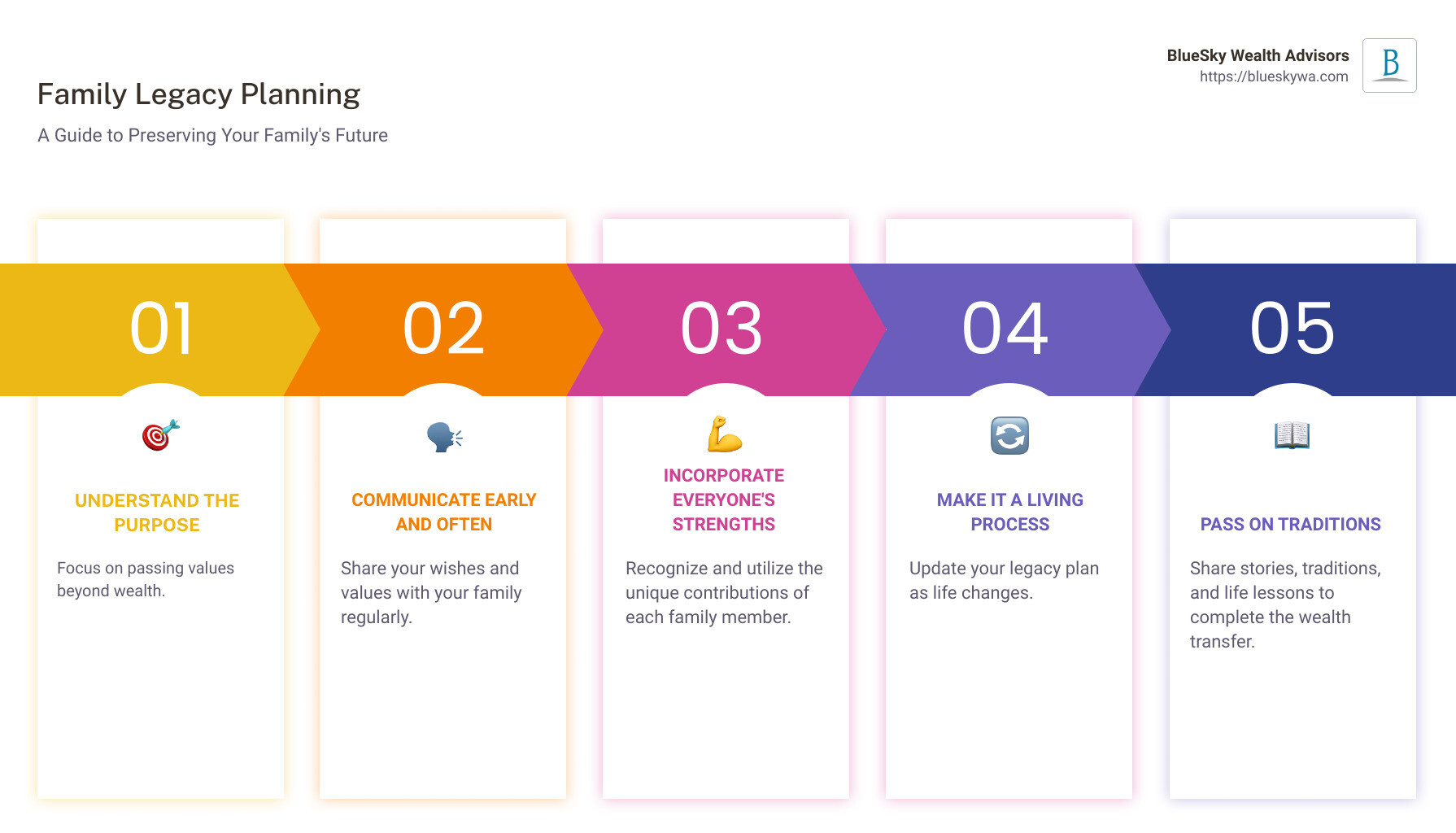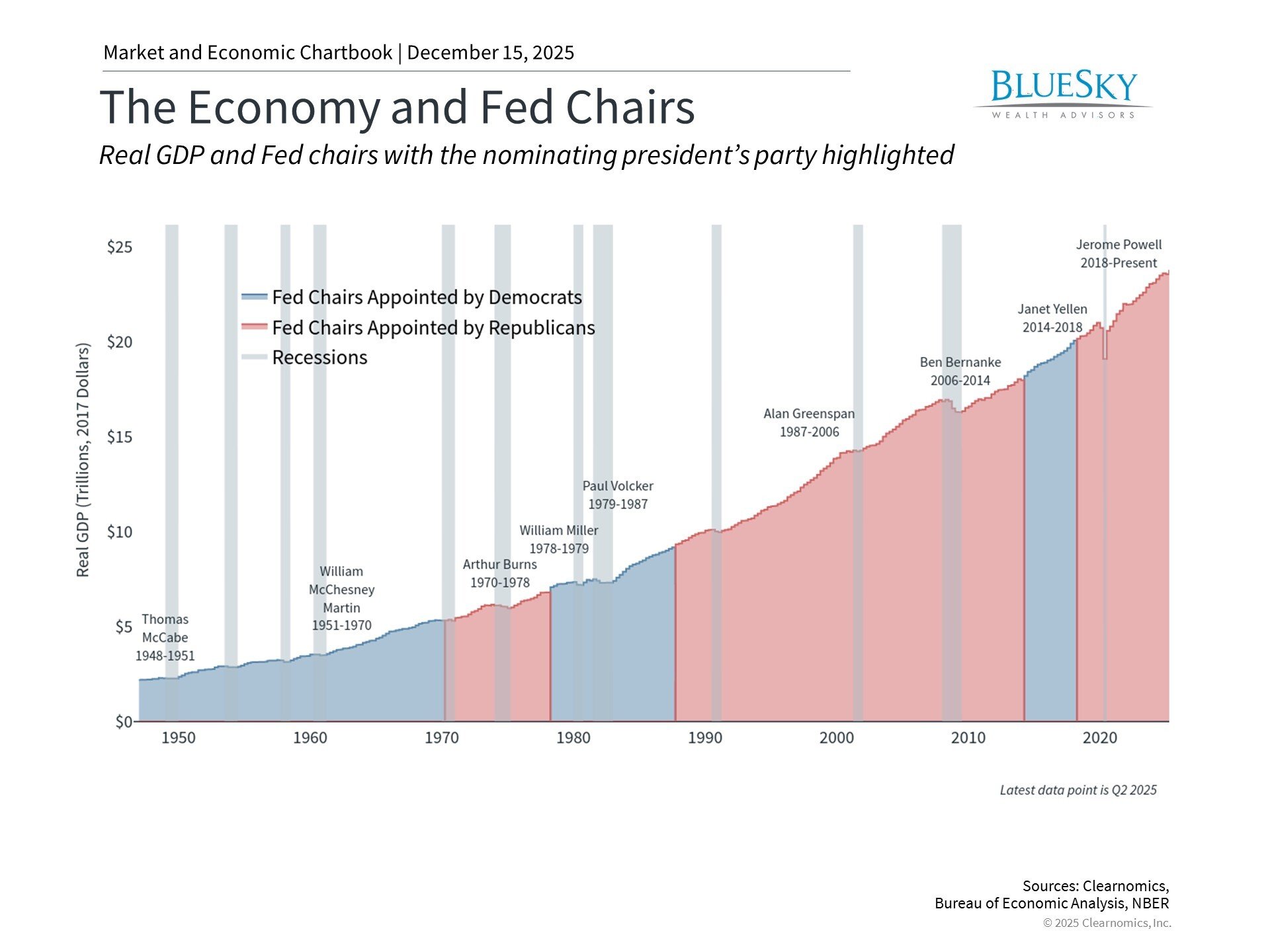
The Complete Guide to Family Legacy Planning
The Complete Guide to Family Legacy Planning

Legacy Planning: At its core, legacy planning is not just about distributing wealth. It’s about passing on values, stories, and traditions that define a family. It’s about creating a roadmap for future generations to follow, ensuring they understand the importance of stewardship, responsibility, and family unity.
Why It’s Important: Imagine a world where your hard work continues to benefit your loved ones long after you’re gone. That’s the power of effective legacy planning. It ensures that your values and wishes guide your family, even in your absence. Moreover, it helps prevent potential conflicts, misunderstandings, and financial mismanagement that could otherwise dilute your legacy.
Family Values: Central to legacy planning is the communication of family values. These are the principles and beliefs that have shaped your life and which you hope to see continue in future generations. Sharing stories, traditions, and life lessons completes the transfer of wealth, making it more meaningful and impactful.
To give you a quick grasp of Family Legacy Planning, here’s what you need to know:
– Understand the purpose: Beyond wealth, focus on passing values.
– Communicate early and often: Share your wishes and values with your family.
– Incorporate everyone’s strengths: Recognize the unique contributions of each family member.
– Make it a living process: Update your legacy plan as life changes.

In the following sections, we’ll delve into the details of how you can efficiently plan and implement these strategies, ensuring that your legacy is preserved and cherished by the generations that follow.
Understanding Family Legacy Planning
Family legacy planning isn’t just about who gets what when you’re not around anymore. It’s way deeper than that. It’s about ensuring your family’s future is secure, your values are passed on, and your financial wishes are respected.
Definition
At its core, family legacy planning is a strategy that goes beyond simple wills or estate planning. It’s about preparing your family to manage and preserve wealth across generations. This includes not just assets and money, but also family values, traditions, and the stories that define who you are.
Importance
Why bother with family legacy planning? Think of it like this: You’ve worked hard to build something meaningful. Without a plan, not only could your financial assets be at risk, but your family might also lose touch with the values and traditions that you hold dear.
A shocking statistic from the research shows that only about a third of family-owned businesses survive to a second generation. Without thoughtful planning, your legacy could be part of that statistic.
Components
A solid family legacy plan has a few key parts:
Estate Planning: This is where you’ll decide who gets what. It includes wills, trusts, and everything else that deals with the distribution of your assets.
Wealth Transfer: This goes hand in hand with estate planning but focuses more on the efficient and tax-effective transfer of wealth to the next generations.
Tax Planning: Nobody likes to give up more than they have to. Strategic tax planning ensures that your heirs get the most out of their inheritance.
Asset Protection: This is about safeguarding your wealth from potential creditors, divorce settlements, and other risks.
Values and Traditions: Perhaps the most unique but crucial component. This involves passing down your family values, stories, and traditions to ensure they live on.
Education: Teaching your heirs about financial responsibility, wealth management, and philanthropy is key to ensuring they’re ready to manage the legacy you’re passing on.
Creating a family legacy plan isn’t just a financial task—it’s a way to ensure your family’s identity and values are preserved for generations to come. As we move into the next sections, we’ll explore how to build traditions, maintain family stories, and ensure your legacy is more than just a memory.
Planning your family legacy is an ongoing journey, not a one-time task. It evolves as your family and your wealth grow. Let’s dive deeper into how you can create a lasting legacy that honors your life’s work.
Key Components of a Successful Family Legacy Plan
Creating a family legacy plan is about ensuring that the wealth and values you’ve worked hard to build are preserved and passed on in a way that benefits your family for generations to come. Let’s break down the key components that make up a successful plan.
Estate Planning
Think of estate planning as the foundation of your family legacy plan. It involves creating a will, setting up trusts, and making sure you have the right documents in place to manage your estate when you’re no longer able to. This isn’t just for the wealthy; it’s for anyone who wants to make sure their assets are distributed according to their wishes, without leaving a burden on their loved ones.
Wealth Transfer
Transferring wealth isn’t just about handing over a lump sum of money. It’s about doing it in a way that supports your family members to achieve their own goals and maintain the family’s financial health. This might mean setting up educational trusts for grandchildren, or creating a structured inheritance plan that provides income over time, rather than a single, potentially overwhelming, windfall.
Tax Planning
Taxes can take a big bite out of your estate if you’re not careful. Effective tax planning involves understanding how to minimize estate taxes, gift taxes, and other transfer taxes through the strategic use of exemptions and deductions. For example, by gifting portions of your wealth during your lifetime, you can significantly reduce the taxable value of your estate, while also seeing the benefits of your generosity.
Asset Protection
Protecting your assets is about more than just securing them against taxes. It’s also about shielding them from lawsuits, creditors, and other risks that could erode your family’s wealth over time. This might involve setting up specific types of trusts or choosing the right kinds of insurance policies to safeguard your assets.
By carefully considering these components, you can create a family legacy plan that not only preserves your wealth but also passes on your values and traditions. The most successful plans are those that are revisited and revised regularly to reflect changes in your family’s needs and the legal landscape.
In the next section, we’ll explore some real-life examples of family legacy planning in action, showing how different families have navigated the complexities of preserving their wealth and values for future generations.
Creating a Family Legacy
Creating a family legacy is more than just managing assets; it’s about passing down values, stories, and traditions that define your family’s unique identity. Let’s dive into how you can create a lasting legacy that goes beyond the financial.
Traditions
Traditions are the glue that holds families together through generations. They can be as simple as a yearly family reunion, a special holiday recipe, or a game night every Friday. These traditions become cherished memories and are eagerly anticipated by each generation. They offer a sense of belonging and continuity that is invaluable.
Family Tree
Building a family tree is a powerful way to connect with your ancestors and teach your children about their heritage. It’s a visual representation of where they come from and the people who contributed to their story. This can be a fun project involving research, interviews, and maybe even a DNA test to discover distant relatives and origins.
Digital Albums
Preserving family memories has never been easier. Creating digital albums allows you to compile photos, videos, and stories in one place. These albums can be shared with the entire family and easily updated with new memories. They serve as a digital time capsule, capturing the essence of your family’s journey through life.
Interviews
Recording interviews with older family members is a priceless gift to future generations. These interviews can capture personal stories, life lessons, and family history that might otherwise be lost. Encourage your children to ask questions and engage in these conversations. These recordings will become more valuable as time goes on.
Teaching about Money
An essential part of family legacy planning is teaching the next generation about managing money. This includes lessons on saving, investing, and philanthropy. By involving your children in financial decisions and discussing the importance of financial responsibility, you’re equipping them with the tools they need to build and preserve wealth through generations.
By focusing on these areas, you’re not just creating a financial plan; you’re crafting a rich, multi-dimensional legacy that encompasses the values, traditions, and history of your family. This holistic approach ensures that your legacy will live on, not just in financial assets, but in the memories and values passed down through generations.
In the next section, we’ll look at specific examples of how families have implemented their legacy plans, providing a clearer picture of how these strategies come to life.
Examples of Family Legacy Planning
When it comes to family legacy planning, there are several ways to ensure your wealth and values are passed down through generations. Let’s explore some real-life examples and strategies involving property and cash distribution, life insurance, philanthropy, and trusts.
Property and Cash Distribution
Case Study: The Johnson Family
The Johnsons owned several properties and had a significant amount of cash savings. They wanted to ensure a fair and efficient distribution among their three children. They decided to use a combination of direct inheritance and a family trust. Each child received a property that matched their needs and interests. The cash was placed into a trust, with distributions tied to milestones like education, marriage, or starting a business.
Strategy: By diversifying the assets each child received and tying cash distributions to milestones, the Johnsons not only ensured fair distribution but also encouraged responsible financial behavior in their children.
Life Insurance
Quote: “Life insurance is not just a payout; it’s a piece of the legacy puzzle.” – Phillip Furlong, Wealth Advisor
Example: The Miller Legacy
The Millers used life insurance to create a safety net for their family. They purchased policies that would cover estate taxes and provide each child with a significant inheritance. This strategy ensured that their other assets, like the family business and real estate, wouldn’t have to be liquidated to cover taxes or provide for their children.
Strategy: Life insurance provided the Millers with a tax-efficient way to transfer wealth and protect the family assets they wanted to keep in the family.
Philanthropy
Fact: Philanthropy can be a powerful tool in legacy planning, allowing families to pass on their values alongside their wealth.
Example: The Smith Legacy
The Smiths were passionate about education and wanted to support it even after they were gone. They set up a scholarship fund at their alma mater, funded by a portion of their estate. This not only provided financial aid to countless students but also instilled a philanthropic spirit in their own children.
Strategy: By incorporating philanthropy into their legacy plan, the Smiths were able to leave a lasting impact that reflected their values and passions.
Trusts
Statistics: Trusts are used by many families to manage and protect their wealth across generations.
Case Study: The Davis Family Trust
The Davises established a family trust to manage their wealth. This trust was designed to provide for the education, health, and maintenance of their children and grandchildren. It included specific provisions for the management of their vacation home, ensuring it remained in the family and was used according to their wishes.
Strategy: The trust allowed the Davises to control how their assets were used, protect them from potential creditors, and reduce estate taxes, ensuring their wealth lasted for generations.
In each of these examples, family legacy planning played a crucial role in not just preserving wealth, but also in passing on values, traditions, and the family’s vision for the future. By carefully considering the distribution of property and cash, utilizing life insurance, engaging in philanthropy, and establishing trusts, families can create a lasting legacy that honors their past while providing for the future.
In the next section, we’ll delve into strategies for effective legacy planning, offering practical advice on how to tailor these examples to your family’s unique situation.
Strategies for Effective Legacy Planning
When it comes to family legacy planning, it’s not just about what you leave behind, but how you leave it. The strategies you use can make a huge difference in how smoothly your legacy is passed on to the next generations. Let’s break down some key strategies that can help ensure your family legacy planning is as effective as possible.
Asset Titling
Asset titling sounds technical, but it’s actually pretty straightforward. It’s about how you own your assets (like your house, bank accounts, and investments) and how these titles impact your estate when you’re no longer around. For example, owning property jointly with rights of survivorship means that when one owner passes away, the surviving owner automatically inherits the property without it going through probate.
Why it matters: Proper asset titling can simplify the transfer of assets and potentially save your family time and money in court fees. It’s a simple yet powerful tool in legacy planning.
Succession Planning
If you own a business, succession planning is crucial. It’s about deciding who will take over your business when you retire, become incapacitated, or pass away. This isn’t just for big companies; even small family businesses need a clear plan.
Real-life example: Imagine a family-owned restaurant that’s been in the family for generations. Without a clear succession plan, disagreements about who should take over can lead to conflicts, or worse, the end of the business. A well-drafted plan keeps the business in the family and operational.
Regular Review
Life changes. So should your legacy plan. Regular reviews of your estate plan ensure it still reflects your wishes and the current laws. Laws change, and so do family dynamics. An outdated plan can lead to unintended consequences.
Quick tip: Schedule a review of your estate plan every three to five years or after major life events like marriage, divorce, the birth of a child, or the death of a beneficiary.
Non-family Executor
Choosing an executor for your estate is a big decision. While it’s common to choose a family member, there’s another option: a non-family executor. This could be a trusted friend, lawyer, or a professional executor.
Benefits: A non-family executor can make unbiased decisions and may reduce family tension. They can also bring professional knowledge to the table, ensuring your estate is managed according to your wishes.
Customized Plans
No two families are the same, and neither are their legacy plans. Customization is key. Your plan should reflect your unique family dynamics, values, and financial situation. It’s not just about distributing assets; it’s about passing on your values and what’s important to you.
For instance: If education is a value you hold dear, setting up an educational trust for your grandchildren can be a way to ensure this value is honored and continued.
In conclusion, effective family legacy planning is about much more than just drafting a will. It’s about thoughtful asset titling, detailed succession planning, regular review, considering a non-family executor, and customizing plans to fit your family’s unique needs. By taking these strategies into account, you can create a legacy that not only preserves your wealth but also honors your family’s values and history, leading seamlessly into the next section of our guide.
Frequently Asked Questions about Family Legacy Planning
When it comes to family legacy planning, there are often many questions that come up. Let’s tackle some of the most common ones to give you a clearer understanding of what it involves and how you can start creating a lasting legacy for your family.
What is a family legacy plan?
A family legacy plan is more than just a set of documents. It’s a strategy that helps you pass on not only your wealth but also your family’s values, stories, and traditions to future generations. It involves detailed planning around estate distribution, tax strategies, philanthropy, and ensuring that your family members are prepared to manage and preserve the wealth they inherit.
How do you create a family legacy?
Creating a family legacy involves several key steps:
Know Your Values: Start by defining what matters most to your family. This could be education, philanthropy, or entrepreneurship. Your values will guide all other aspects of your legacy plan.
Engage in Estate Planning: Work with professionals to draft a will, establish trusts, and make sure your assets are protected and will be distributed according to your wishes.
Implement Tax Strategies: With the help of financial advisors, develop strategies to minimize taxes and maximize what you can pass on to your heirs or to charitable causes you care about.
Educate Your Family: Teach your family about financial management, the importance of stewardship, and involve them in philanthropic activities. This ensures they are prepared to handle the wealth and responsibilities they will inherit.
Regularly Review and Update Your Plan: As your family and financial situation changes, so should your legacy plan. Regular reviews ensure that your plan remains aligned with your goals and current laws.
What is an example of legacy planning?
Let’s look at a practical example:
Imagine a family business owner who wants to ensure the business stays in the family and continues to thrive for generations. The owner starts by creating a succession plan that identifies potential future leaders within the family and outlines training for them. They also establish a family trust to minimize estate taxes and provide financial stability for future generations. Additionally, the owner sets up a scholarship fund to support the education of family members, reflecting a strong value placed on education. Regular family meetings are held to discuss the business, the family’s philanthropic efforts, and to educate younger members on financial management.
By taking these steps, the business owner is not only planning for the financial future of the family but also instilling important values and preparing the next generation for leadership and stewardship of the family’s legacy.
Remember that family legacy planning is not a one-time task but an ongoing process that adapts with your family and the changing world. With careful planning and open communication, you can create a legacy that supports your family for generations to come.
Conclusion
In wrapping up our deep dive into family legacy planning, it’s clear that this journey is both profoundly personal and incredibly complex. It’s about more than just assets and investments; it’s about instilling values, preserving traditions, and ensuring that your family’s future is secure and aligned with the vision you’ve carefully crafted together. This is where BlueSky Wealth Advisors steps in, offering a beacon of guidance and expertise in the often turbulent waters of financial planning.
At BlueSky Wealth Advisors, we understand the unique challenges and opportunities that come with family legacy planning. Our approach is rooted in providing personalized financial solutions that are tailored to meet the specific needs and aspirations of your family. We recognize that each family’s legacy is distinct, and there’s no one-size-fits-all solution. Our team is dedicated to working closely with you to develop a strategy that reflects your family’s values, goals, and dreams.
Proactive tax strategies play a critical role in effective legacy planning. By anticipating future challenges and opportunities, we can help you navigate the complexities of tax planning with ease. Our expertise in this area ensures that your legacy plan is not only robust and comprehensive but also tax-efficient. This proactive approach allows us to identify potential tax-saving opportunities and implement strategies that can significantly enhance the impact of your legacy.
In conclusion, family legacy planning is a dynamic and ongoing process that requires careful thought, strategic planning, and the support of experienced professionals. At BlueSky Wealth Advisors, we’re committed to providing the guidance and expertise necessary to navigate this process successfully. Our focus on personalized financial solutions and proactive tax strategies ensures that your legacy plan is not only aligned with your family’s values and goals but also positioned to thrive for generations to come.
Let us partner with you in this journey. Together, we can create a lasting legacy that reflects your family’s unique story and aspirations.





